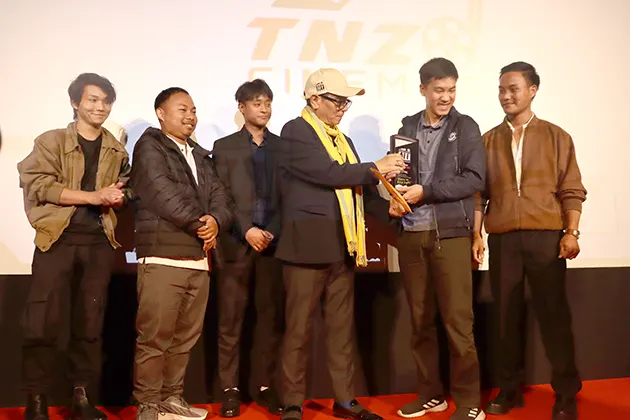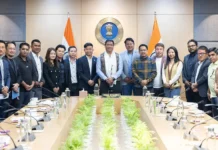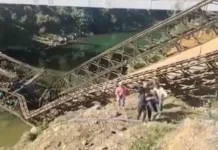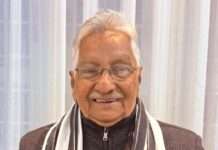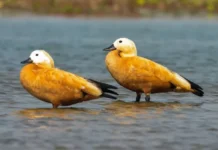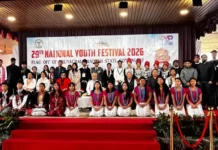ITANAGAR, 10 Feb: The Arunachal Film Festival (AFF)-2025 wrapped up last Saturday after a three-day celebration of films, creativity, and emerging local talents.
The festival, which commenced on 6 February, offered a platform for showcasing the evolving film industry in Arunachal Pradesh, with focus on local filmmakers, technical expertise, and animation talent.
As the festival concluded, awards were presented to the standout films. Grandpa What’s Your Name, directed by Lonsang Phuntso, won the best documentary award, while Our Land Our Lives by T Hasa received a special mention award in the documentary category. In the short film category, Mok Mu, directed by Anandra Namchoom, won the best short film award, with Change, produced by Down Mountain Studio, receiving a special mention award.
Addressing the closing ceremony, Information & Public Relations Minister Nyato Dukam commended the Information & Public Relations (IPR) Department for organising the event, and acknowledged the perseverance and creativity of local filmmakers, despite the many challenges they face.
“The film industry in Arunachal Pradesh is still in its infancy, but there is a lot of promise. The future is undoubtedly bright,” said Dukam. He emphasised that challenges such as the lack of a common language hinder the ability to reach a broad audience, and urged the IPR Department to devise solutions to these issues, calling for initiatives that would strengthen the state’s film industry and make it more vibrant.
He also pointed out that the success of AFF-2025 “demonstrates the progress made in fostering a strong filmmaking community in the state.”
The minister said that the Film and Technical Institute of Arunachal would soon be commissioned, providing vital resources and training to aspiring filmmakers, photographers, and technical professionals. “Collective efforts must be made to overcome the logistical hurdles faced by filmmakers, including funding and
distribution challenges, to elevate the industry and make Arunachal Pradesh a prominent player in India’s film landscape,” he said.
IPR Secretary Nyali Ete shared his vision for the future of filmmaking in Arunachal. He highlighted the festival’s success, particularly noting the growing interest in local filmmaking, as a positive sign for the state’s future film culture.
Ete elaborated the department’s ongoing efforts to support budding filmmakers through initiatives like the AVGC-XR policy, recently introduced by the information & broadcasting ministry. He also acknowledged the significant hurdles faced by filmmakers, including limited finances, equipment, and distribution networks, and emphasised the importance of creating a sustainable ecosystem to help filmmakers succeed. He also confirmed that the Film and Technical Institute would offer specialised courses and workshops, providing valuable skills and knowledge to local youths eager to join the industry.
He further reassured filmmakers that “the IPR is fully committed to helping them by providing platforms like the AFF for showcasing their work and fostering industry growth.”
The final day of the festival featured an array of screenings, workshops, and engaging sessions. Documentaries such as Grandpa What’s Your Name, Khew Rane, and Seeds of the Future were screened, offering audiences a powerful glimpse into real-life stories. The short film category saw standout entries like Mok Mu, Changes, and When Will the Moon Bloom Again?, captivating viewers with their engaging narratives. A special highlight of the festival was the ‘In Conversation with Chum’ session, where the acclaimed actress shared her journey from Northeast India to Bollywood, inspiring the audience with her experiences.
Two insightful workshops also drew large audiences. Raktim Modol, a professor at the Film and Television Institute of India (FTII), conducted a session titled ‘The Art of Cinematography’. Modol spoke on the vital role cinematography plays in storytelling, emphasising the importance of lighting, composition, and a deep understanding of the script. He shared his expertise on cinematography across different genres, including commercials, documentaries, and fiction films, providing attendees with a well-rounded understanding of the art form.
The ‘Animation Filmmaking: From Script to Screen’ workshop, led by Vinod VS from Toon Media Group, explored the entire animation production pipeline. From conceptualisation and storyboarding to 3D modelling, character design, and sound, Vinod explained how animation can transcend traditional storytelling, offering filmmakers a new avenue to impact audiences emotionally and culturally. His workshop was particularly valuable for those interested in pursuing animation filmmaking, a field that continues to grow in significance.

